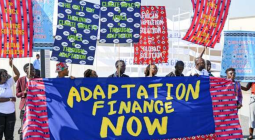We can prepare for hurricanes, heatwaves and flooding – but only if we are bold at Cop29
The right funding now can protect the frontlines of the climate crisis from the worst effects of extreme weather events
As we approach Cop29 in Baku, world leaders are due to set a new climate finance goal – a sum set aside to help poor countries cut their greenhouse gas emissions and adapt to the effects of the climate crisis. Their negotiations take place against a backdrop of increasingly severe weather events. This year alone, we have witnessed deadly heatwaves across north Africa, Mexico, India and Saudi Arabia; a historic drought across southern Africa; catastrophic wildfires in the Brazilian Pantanal wetlands; record-breaking hurricanes in the Caribbean and the US; and plenty more. The climate emergency knows no borders and spares no one.
These events serve as stark reminders of the pressing need for world leaders and all of us to protect vulnerable communities on the frontline of the climate crisis. For many developing countries, particularly in Africa, the cost of climate impacts is staggering. African nations are losing up to 5% of their GDP because of climate extremes, while some are diverting as much as 9% of their national budgets to overcome the fallout from them. The latest report by the World Meteorological Organization estimates that Africa south of the Sahara alone will need $30bn-$50bn annually over the next decade just to meet the costs of protecting communities facing unprecedented climate-related disasters. We will not be able to reduce poverty, eliminate hunger and build a prosperous and resilient global community without addressing the climate crisis.
The scale of this financial burden is overwhelming. About $89.6bn was provided to developing countries in 2021, according to the Organisation for Economic Co-operation and Development. Yet global climate finance remains disproportionately focused on mitigation. About 90% of climate finance goes towards reducing emissions rather than supporting countries to prepare and build resilience to the impacts of the climate crisis. This presents a significant challenge, particularly for developing nations that are already bearing the brunt of crippling debt. I urge world leaders to tip the balance between mitigation and adaptation finance, ensuring both are adequately funded.
Tipping the balance means increasing grant-based public finance for adaptation to match the scale of the challenge. This must be a core element of the new collective quantified goal (NCQG) being negotiated at Cop29, in which adaptation finance will be recognised as a separate, equal priority. Expanding adaptation finance ensures a fairer distribution of resources to protect communities already experiencing the devastating effects of the climate crisis.
The focus on adaptation finance at Cop29 must be bold and transformative. The stakes are too high for incremental change. The Cop29 presidency’s appointment of a ministerial pair (from Ireland and Costa Rica) for adaptation, who will lead consultations and bilateral discussions leading up to the event, is a positive signal of the importance placed on adaptation within the NCQG negotiations.
At Cop29, leaders must pledge ambitious actions to increase public adaptation finance, treating it as a priority distinct from mitigation and loss and damage. These pledges must be grounded in the needs of developing countries, with simplified application processes to ensure better access for the most vulnerable. Only by doing so can we hope to narrow the adaptation gap and move closer to achieving the global goal on adaptation – part of 2015’s Paris framework that aims to reduce vulnerability to climate breakdown.
Agricultural adaptation, in particular, is critical for addressing the escalating challenges posed by the climate crisis. During my tenure as UN secretary general and in my current leadership roles, this has been my top priority. At Cop29, I urge world leaders to pledge substantial support for agricultural research and development to foster the innovation necessary for addressing these challenges. Investing in agricultural R&D is essential for developing climate-resilient crops, sustainable farming practices, and improved water and soil management techniques. Supporting agricultural R&D will not only boost productivity and enhance resilience, but will also contribute to a more stable and secure global food system for future generations.
Cop29 offers an opportunity for a new era of climate leadership – one that prioritises those on the frontlines. I encourage leaders to bring bold pledges to the table that reflect the scale of the challenge. This means simplifying processes, increasing access to financing for vulnerable nations and ensuring that adaptation is treated as an equal priority to mitigation and loss and damage.
Now is the time for world leaders to show real global leadership. The question remains: will we rise to meet this challenge?
Cover photo: Women in Limpopo province, South Africa apply agroecology methods to develop smallholdings in the fight against food insecurity. Photograph: Lucas Ledwaba/Alamy




